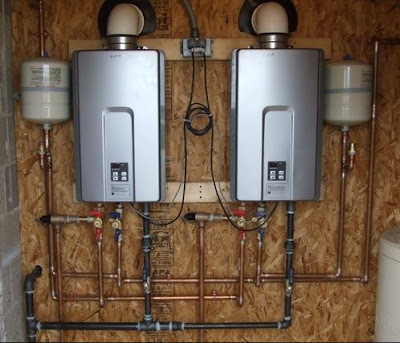Having said that, here are some tips to keep in mind:
Type of FuelThere are two common types of fuel used by water heaters to operate: gas and electricity. Both gas and electric water heaters come with installation, initial, and operation costs, and energy efficiency will be different. Next to the HVAC system, water heating consumes the most energy in the home. Thus, it is important to keep your costs to the minimum.
The choice between a tankless or tank-type heater depends not only on your preference, but on other factors as well. A tank-type heater can supply various fixtures at the same time – without any temperature fluctuation. You get hot water anytime you need it. The best tank-type units have a useful life of around 10 years, providing hot water efficiently even during peak times.
A tankless unit requires a higher initial cost. But, it is often smaller and wall-mounted. The heater can provide you with as much hot water as you need anytime. A large-sized unit is able to supply around 4 fixtures at the same time. High quality tankless units use green technology, and can last for many years.
High Efficiency Performance
The ideal water heater is highly efficient, allowing you to save more money and energy. Best-selling models today are often Energy Star-rated. Check out the unit’s EF factor that describes that burner and tank design quality, ignition system, and insulation, among others. The higher the unit’s R value, or the thicker its insulation, the better its performance potential.
Electric water heater units often have higher energy efficiency than gas units. Electric heat pump models are the most efficient electric models. Condensing gas heaters, on the other hand are the most efficient gas units.
For many households, the price and length of the warranty period are among the primary factors in choosing the water heater model to buy. The thing is, a cheap water heater often comes with a shorter warranty and lower quality. The best water heater models often command a higher price tag. Technology is often more advanced, and the units have better efficiency, reliability, durability, and longer warranty periods.
A lot of models today have a 6-year warranty, and those that offer an extended coverage offer a warranty period of 9 to 12 years. An extended warranty, however, entails additional cost.
The primary difference between models that offer a short warranty period and those that offer a longer term lies in the anode rod. Units that come with a longer warranty have a bigger anode rod installed. To save on money, some people opt to buy a lower priced water heater with a shorter warranty period, and just replace the anode rod later.
Leading brands often offer functional features such as self-cleaning system, stainless steel heating elements, and high recovery rate, among others. They also come with a long 12-year warranty. Lower-end models often offer only the basic features. Their warranty period is often shorter, as well.
Final Word
Keep the tips provided above. They can provide significant help when you are trying to find the right type of water heater to buy for your home. It is also a good idea to read online reviews and recommendations from actual buyers. A spartan water heaters that is trusted by consumers, and one that has many years of experience in the industry is often a good and safe choice.
Related Content: Our Favorite Remodeling Projects From 2018



No comments:
Post a Comment